Summer research opportunities prepare undergraduates for future research and careers

Research opportunities — common at most universities for graduate students — often are scarce for undergraduates. At UNC Charlotte, the OUR (Office of Undergraduate Research) Summer Research Scholar Program matches more than 100 qualified rising sophomores, juniors and seniors annually with paid summer research opportunities led by faculty researchers from disciplines across the University.
“Undergraduate students have an exceptional opportunity to experience and learn foundational research processes through hands-on projects designed to build new knowledge and skills, and one-to-one mentoring,” said Erin Banks, assistant dean for undergraduate research. “Forty percent of our participants pursue graduate education, and they are able to directly apply the lessons from this initial experience to future scholarly or professional roles.”
Summer research experiences culminate in a symposium where students present the details of their projects. Among the students and faculty mentors that participated in the OUR Summer Research program in 2021 are:
PUBLIC HEALTH SCIENCES
Student researchers Catherine Luba and Mahita Sadula worked alongside associate professor Monika Sawhney to explore the impact of the COVID-19 pandemic on the health and well-being of health care professionals.
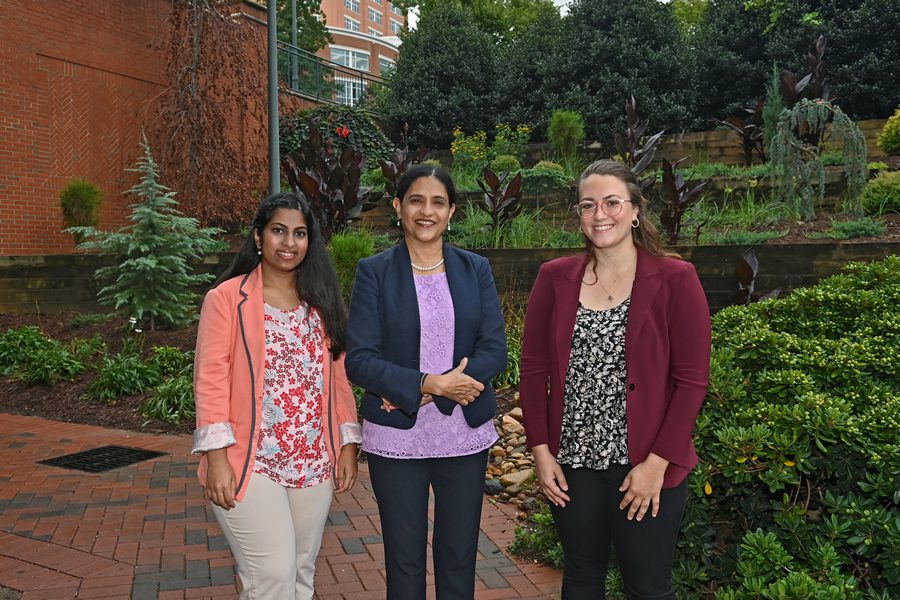
Dr. Sawhney: “I’m convinced that a little investment in research for undergraduate students goes a long way. It’s essential to create and offer these opportunities, thus preparing students for their careers. I’m proud to have this unique opportunity in training future generations of professional researchers.”
Catherine Luba, junior, psychology major and biology minor: This research appealed to me because my goal is to work in the medical field as a physician, physician associate or other position. To learn more about how the COVID-19 pandemic affected the mental health and well-being of health care professionals intrigued me. This project combined both of my interests.”
Mahita Sadula, junior, biology and sociology majors, concentration in medical sociology: “I was surprised to learn about the various resources available to undergraduate student researchers. I gained access to library resources, databases and software tools. Through hands-on research experience I was able to realize the specific field of work that interests me and the research topics I plan to explore in the future.”
DATA SCIENCE
Student researcher Manav Majumdar worked closely with Doug Hague, executive director and professor of practice for the School of Data Science, to analyze the performance of hundreds of high school cross country distance runners to predict their individual performance in the upcoming season and how it may impact teams’ placement at a forthcoming state championship.
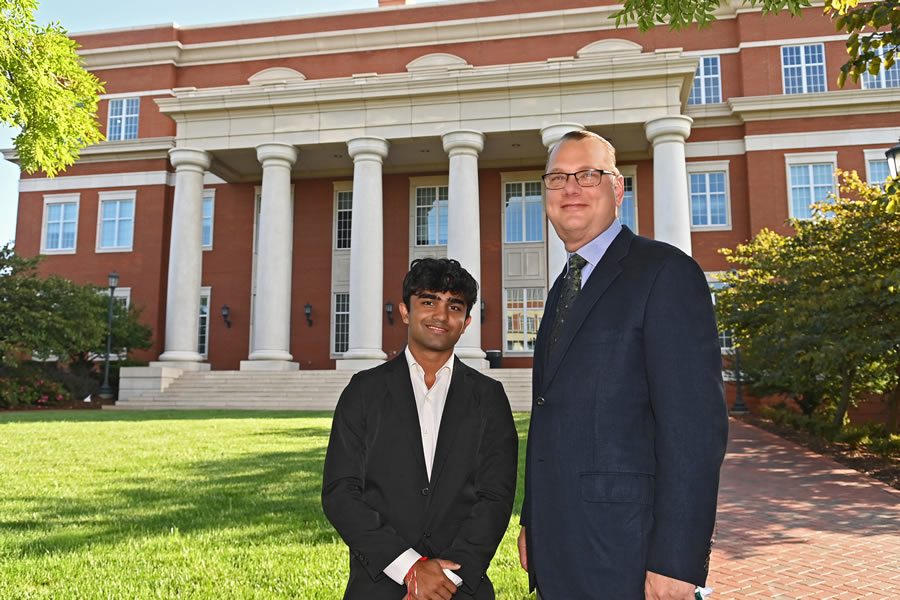
Dr. Hague: Our sports analytics research team is working to show students that data and analytics is a core component of research, and that they can blend their passion with research to accomplish both fun and interesting things. We are still digging into all the “whys” of the results; it’s fascinating to see this work evolve and continue.”
Manav Majumdar, sophomore, business analytics and computer science major:
“A mentor who could directly assist me with new additions to research was key to my understanding. Dr. Hague always had a lesson to take away. The skill of creating an API (Application Programming Interface) will forever stay with me.”
SPECIAL EDUCATION AND CHILD DEVELOPMENT
A research team led by Associate Professor of Gifted Education Cindy Gilson deciphered a qualitative analysis research study to understand how school districts across 12 North Carolina counties addressed the academic, social and emotional needs of gifted high schoolers. Student researcher Josie Peplinski compiled demographic data, coded and summarized differentiation practices, checked the team’s coding and contributed to its manuscript.
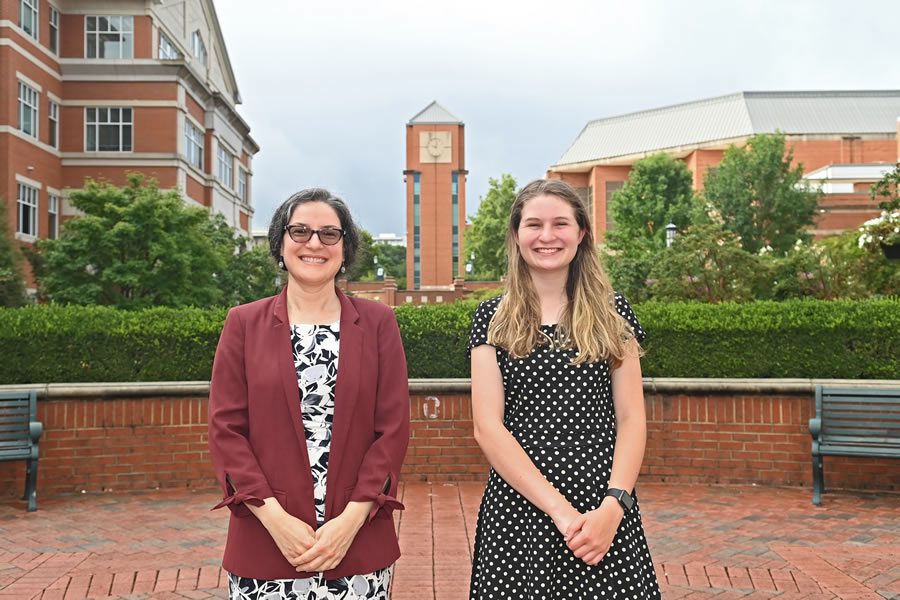
Dr. Gilson: “Research is an essential life skill and human right that all students should learn and practice in an authentic and intellectually stimulating real-world context. The OUR program helps undergraduate students develop self-efficacy for research, which has the potential to open doors to advanced studies, graduate school or future research positions.”
Josie Peplinksi, senior, political science major, minors in history and secondary education: “Research positions are an ideal way to build skills like communication and collaboration; this opportunity helps students build connections with brilliant professors and community members. My experience has made me confident in conducting my own research in the future.“
PHYSICS & OPTICAL SCIENCE
Professor Susan Trammel and student researcher Maddie Kern set out to develop a new processing method — called light-assisted drying — to dehydrate vaccines for long-term dry storage to reduce or eliminate the need for cold storage.
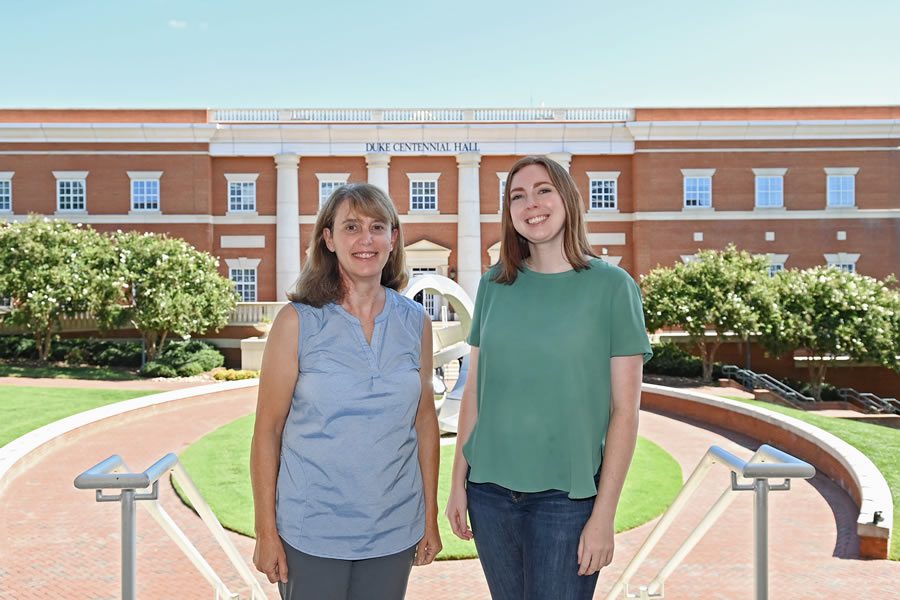
Dr. Trammel: “I enjoy helping undergraduate students define their career and education goals. Working in a research lab provides hands-on skills, and experience understanding the research process and technical writing practice. The experience is valuable whether students plan to attend graduate school or work in industry.”
Maddie Kern, senior, physics major, minors in mathematics and art history: “Dr. Trammel was receptive to ideas and let me take charge of my research but she was also direct about setting goals. Best of all was working under the guidance of another woman in physics who really cares about the success of her students.”
ENGINEERING TECHNOLOGY AND CONSTRUCTION MANAGEMENT
Student researcher Janaat Ejaz, alongside assistant professors Nicole Barclay and Michael Smith, addressed the problem of aging water infrastructure in North Carolina and related flooding risks. They developed data-driven models for predicting water infrastructure conditions and identified vulnerable pipelines. Janaat reviewed related research articles, and collected and processed data for building the digital models.
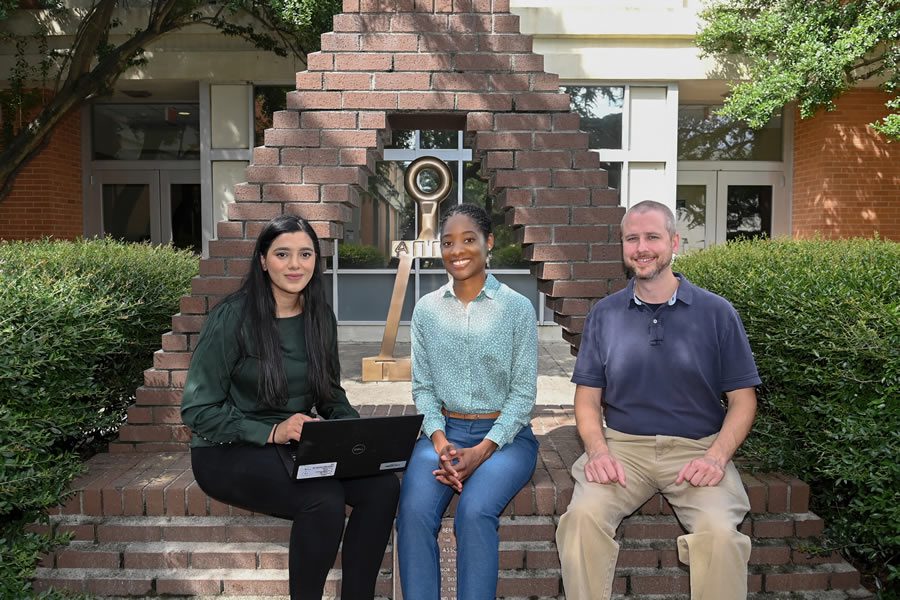
Dr. Smith: “Students learn through hands-on experience. This provides a way to help train, recruit and, hopefully, retain talented students for graduate school.”
Dr. Barclay: “My own undergraduate research opportunity helped shape my career path, so I believe it is my responsibility to offer and facilitate the same for current and future undergraduate students.”
Janaat Ejaz, senior, double major in geography and computer science with concentrations, respectively, in GI science and technology, and bioinformatics: “I learned to effectively communicate my ideas and to analyze and critique the work of others and myself. The guidance, feedback and support I received from my mentors has helped me prepare for graduate school and my career.”
BIOINFORMATICS & GENOMICS
Josephine Leugers and Research Assistant Professor Robert Reid worked to develop hypotheses about human health connections and predictions from genomic information that is embedded in 30 million-plus PubMed publications. Josephine’s role was to code (the programming language) Python to pull and analyze relevant data.
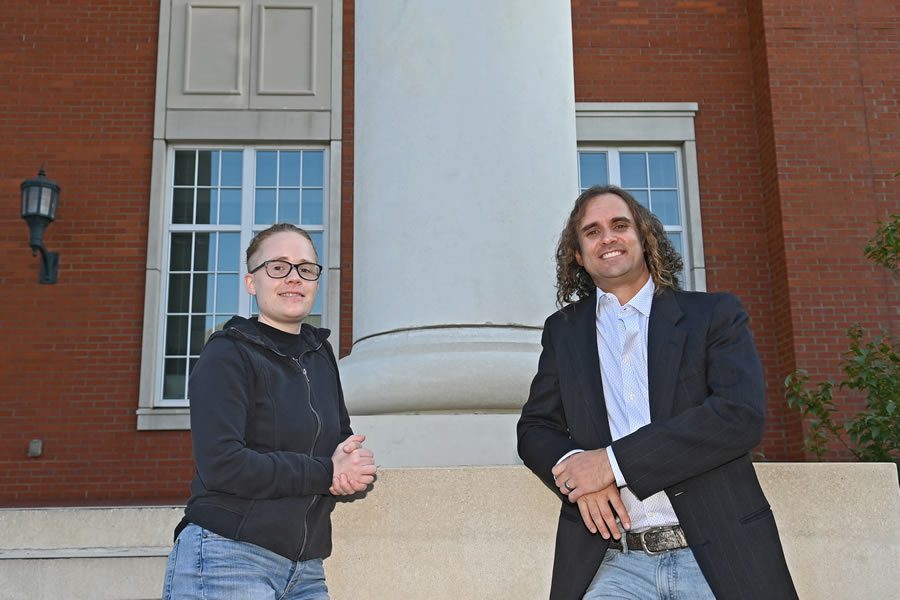
Dr. Reid: “We need talented, highly motivated people to aid in research. Having undergraduates participate gives me a chance to introduce students to graduate school opportunities and encourage them to pursue further studies that will have an impact on human health.”
Josephine Leugers, senior, mathematics major/statistics concentration, history minor: “There’s often a disconnect between a subject as it’s taught in class and what it’s like to work in that field. Undergraduate research is a great way to find out if you’re going to enjoy a job before you graduate.”
MANAGEMENT
Student researcher Jett Naisang, under the direction of Victor Zitian Chen, associate professor of international management, and doctoral student Holly Holladay, reviewed existing literature about consumer research and its methodologies; her particular role was to extract information to help identify measurement consistencies and inconsistencies in the data.
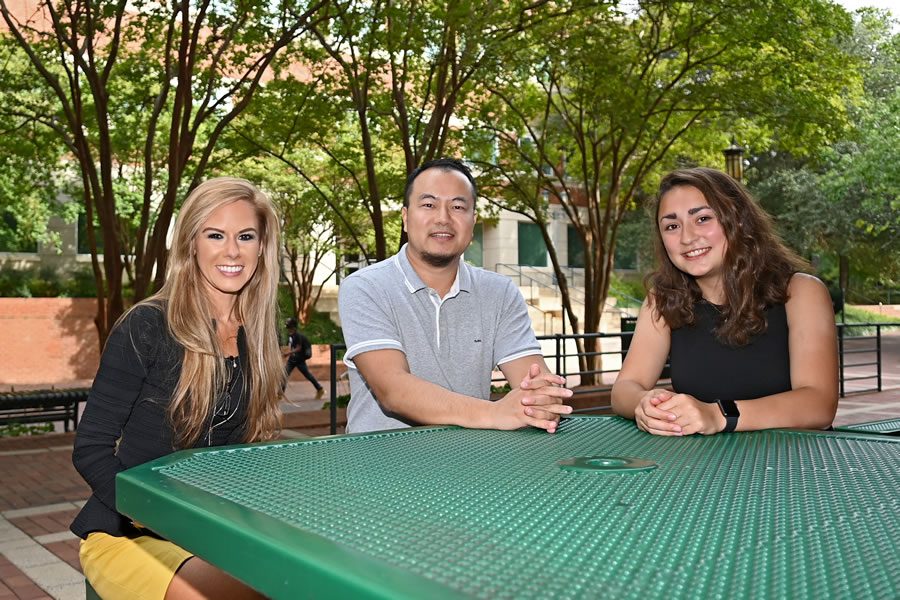
Dr. Chen: “Systematic review is a necessary skill for scholars at any stage of their career and is the foundation for a scholar to understand state-of-the-art knowledge. It’s also among the most accessible techniques for starting scholarly experiences.”
Jett Naisaing, sophomore, business administration major: “Summer research helps to strengthen research skills and prepare students for future projects. This was a good fit for me because it was similar to my major; I learned to research more efficiently and strengthened my business skills.”
DANCE
Nia Mills and her mentor Tamara Williams, assistant professor of dance, focused on the ways dancers have used dance as a tool to bring awareness to social issues and inflict societal or political change.
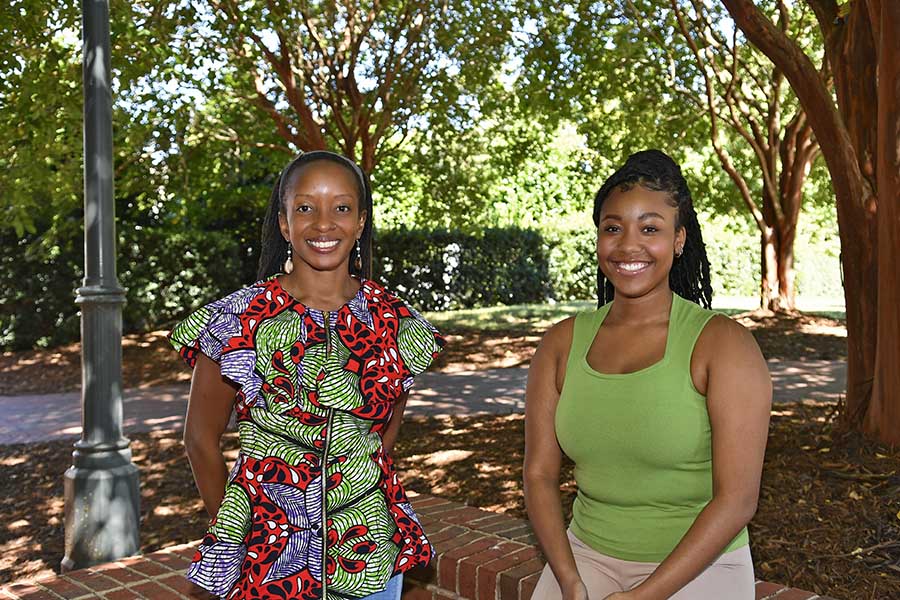
Dr. Williams: “Research provides students with opportunities for a deeper and diverse understanding of the field they are studying. In this instance, investigations help to spark further interest and provide a means of motivation to discover more about people and their contributions to society.”
Nia Mills, junior, dance major, concentration in dance education: “I never thought I would be interested in research but being a part of this program opened my eyes to a new avenue in the dance world. I learned how extensive research can be and also how rewarding and eye-opening it is. It opens up an entire world of never-ending knowledge.”